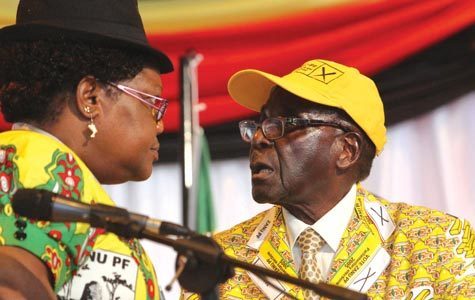
THE Zanu PF annual national people’s conference has come and gone, but the much anticipated fireworks failed to materialise with doubts emerging whether the event managed to rejuvenate the party ahead of next year’s watershed elections.
REPORT BY PATRICE MAKOVA
Analysts said apart from the usual anti-western rhetoric and empowerment mantra, the conference held in Gweru just over a week ago, lacked robust debate and discussion on bread and butter issues affecting the ordinary person.
They said despite President Robert Mugabe’s impassioned pleas to end factionalism and jockeying for his post, Zanu PF remained deeply divided, while tackling corruption, as pledged, was unlikely to happen.
Political analyst, Thabani Nyoni said the event was held at a controversial new state-of-the-art US$6,5 million conference centre constructed in a record three months, although the source of the funds remains a mystery.
He said Zanu PF ministers gave an update to the delegates of their work in government, confirming that the party had no regard for the inclusive government.
But Nyoni said in terms of issues on the table, Zanu PF continued to attack civil society organisations, the West and also justifying their quasi-economic activities and corruption.
“There was no debate except the usual command and control approach to debate which they view as a sign of unity and consensus,” he said. “From the conference, it would appear the party is a perfect machine with no blunders except its enemies outside, which is a big lie.”
- Chamisa under fire over US$120K donation
- Mavhunga puts DeMbare into Chibuku quarterfinals
- Pension funds bet on Cabora Bassa oilfields
- Councils defy govt fire tender directive
Keep Reading
The conference resolved to use indigenisation as a campaign tool, while at the same time eliciting support of church leaders, musicians, sports personalities and other influential people.
Party needs leadership renewal: analyst Another political analyst, Clever Bere said the Zanu PF conference, like their previous ones, failed to address the major challenge confronting the party — leadership renewal.
“They may deliberate on policy and other things, but the only way they can rejuvenate their party is by bringing in youthful, fresh and vibrant leadership,” he said. “Inasmuch as Mugabe might be viewed as the unifier in Zanu PF, it is my belief that he is now more of a liability than resourceful.”
Bere said the country has a youthful population and would most likely lean towards a youthful leadership.
He said as long as the leadership crisis was not resolved, political scheming and underhand lobbying and positioning would always affect the unity of the party.
“Mugabe is only surviving because he has a patronage system that has allowed his people to benefit from where they would not have sowed,” he said.
“He has also survived because of the failures of MDC-T and in particular the inadequacies of its leader, Prime Minister Morgan Tsvangirai.”
Absent was the electrifying atmosphere until right at the conclusion of the conference when the different provinces were being awarded prizes for the ability to organise themselves.
However, Mugabe insisted the conference was a resounding success which would result in an electoral victory.
Mugabe, who turns 89 in two months’ time, was endorsed as the party candidate vowing to fight like a “wounded beast” in order to reverse his loss in 2008.
‘Indigenisation will only benefit elites’
University of Zimbabwe lecturer, Professor John Makumbe said it was clear Zanu PF was not ready for elections even if the party dangled the indigenisation carrot.
“Their structures are in shambles. When they take the issue of ownership of companies to rural areas, people will know that this is fiction,” he said. “The community ownership trusts have not benefitted them. They know indigenisation is for the elite.”
Political analyst and social rights activist, Hopewell Gumbo agreed, saying only a few Zanu PF “diehards” would be “fooled into buying the indigenisation mantra”.
“The programme will only benefit elites and not the generality of the poor majority. This may not significantly change the Zanu PF voting tally,” he said.
“Their card remains violence, whose June 27 [2008 election] residues is enough to terrorise people into the coming polls, as well as the weaknesses and blunders of other political parties.”
Gumbo said corruption had gone to “incurable” levels, likening Mugabe’s call for an end to the crime to “chasing a moving target”.
“It is unfortunate that he will not achieve its eradication during his lifetime unless he takes radical steps to deal with it,” he said. “He risks being embarrassed after his anti-corruption statement, but definitely one or two big fish will be sacrificed.”
Political scientist, Shakespeare Hamauswa said Mugabe was in a dilemma on how to deal with corrupt people within his inner circle.
He said while failure to act on his promise to root out rampant corruption would make him lose credibility, sacrificing any of his top lieutenants ahead of elections may further divide Zanu PF.
Hamauswa said threatening the different factions within Zanu PF would not end divisions in the party.
“There is a need to address the root causes of factionalism in Zanu PF in order to come up with tangible solutions,” he said.











